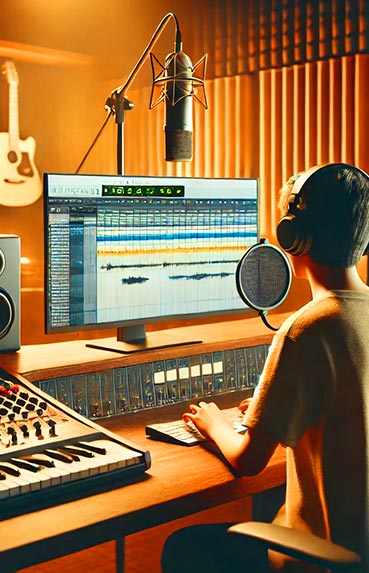In a world where music is a universal language, creating a personalized song has become a powerful form of personal expression and emotional connection. Whether you're writing a song for a special occasion or simply for pleasure, one of the first and most crucial steps is choosing the right musical genre. The choice of genre not only defines the tone and style of your song but also influences how it will be emotionally perceived. Here, we explore how to make this decision in an informed and strategic way.
Understanding the Importance of Musical Genre
The influence of genre on emotional perception
The musical genre acts as a framework that determines how emotions are perceived in a song. For example, a pop theme generally evokes feelings of joy and energy, while a ballad tends to be more melancholic and reflective. According to a study published in the journal "Psychology of Music," musical genre significantly influences the emotional perception of listeners. This means that choosing the right genre can enhance the message you wish to convey.
Cultural and audience connection
Genre also has a cultural and social component. When selecting a genre, it’s important to consider your audience. For instance, if you’re composing for a specific cultural event, choosing a genre that resonates with that culture can make your song more impactful and relevant. Additionally, some genres may have a broader audience than others. For example, pop and rock tend to have a more universal appeal compared to more niche genres like jazz or reggae.
Factors to Consider When Choosing a Genre
The intention behind the song
Before selecting a genre, ask yourself what the intention of your song is. Do you want it to be cheerful and motivating, or do you prefer something more introspective and deep? For example, if you're writing a love song, you might opt for a romantic genre like R&B or a ballad. If you're looking to motivate and energize, rock or pop might be more suitable.
Personal skills and preferences
Evaluate your own musical skills and personal preferences. If you have experience playing certain instruments, this could influence your choice of genre. For example, if you are a skilled guitarist, rock or blues might be natural choices. Additionally, consider your personal preferences. It’s important that you feel comfortable and excited about the genre you choose, as this will reflect in the authenticity of your song.
Exploring Different Musical Genres
Pop: Versatility and universal appeal
Pop is known for its versatility and universal appeal. This genre is ideal if you're looking to create a catchy and accessible song. Pop songs often have simple structures, making it easy to create memorable lyrics. A classic example is "Shape of You" by Ed Sheeran, which combines catchy rhythms with simple lyrics.
Rock: Energy and emotion
Rock is perfect for those looking to infuse energy and emotion into their music. This genre ranges from classic rock to punk and metal. Bands like Queen and The Rolling Stones have demonstrated how rock can be used to convey a wide range of emotions, from rebellion to introspection.
Jazz: Complexity and sophistication
For those seeking a musical challenge, jazz offers complexity and sophistication. This genre is ideal for musicians who enjoy improvisation and experimenting with complex chords. Artists like Miles Davis have shown how jazz can be a platform for unlimited musical creativity.
Hip-hop: Narrative and rhythm
Hip-hop is known for its emphasis on narrative and rhythm. If you have a story to tell or a message to convey, this genre could be the perfect choice. With its focus on lyrics and flow, hip-hop allows for the exploration of social, personal, and political themes effectively. Artists like Kendrick Lamar have used hip-hop to address complex and emotional topics.
Don’t forget that the choice of genre should also resonate with you personally. Authenticity is key to creating an emotional connection with your audience.
Practical Tips for Choosing the Right Genre
Research and listen to different genres
Take time to listen to a variety of musical genres. This will not only broaden your musical knowledge but also allow you to identify which styles resonate most with you. Platforms like Spotify and YouTube are valuable resources for exploring different types of music.
Experiment with genre fusions
Don’t be afraid to experiment with genre fusions. Many contemporary artists have found success by combining elements of different styles. For example, the song "Old Town Road" by Lil Nas X blends elements of country and hip-hop, creating a unique and fresh sound.
Consider instrumentation
Instrumentation can also influence your choice of genre. If you have access to certain instruments or musicians, this could guide your decision. For example, if you have a piano at your disposal, you might consider genres that take advantage of this instrument, such as jazz or soul.
Get feedback
Once you've created a preliminary version of your song, share your work with friends, family, or fellow musicians to receive feedback. Sometimes, an external perspective can help you identify if the chosen genre is the most suitable for your song.
Concrete Examples of Genre Choice
Wedding song: Romantic ballad
Imagine you're composing a song for a wedding. In this case, a romantic ballad could be the perfect choice. This genre is known for its ability to evoke deep emotions and create an intimate and moving atmosphere.
Motivational song: Pop-rock
If your goal is to create a motivational song, pop-rock can be a great ally. This genre combines the energy of rock with the accessibility of pop, ideal for conveying a positive and encouraging message.
Protest song: Folk or hip-hop
For a protest song or one with a social message, folk or hip-hop are powerful genres. Both styles have historically been used to address political and social issues, providing a platform for expression and change.
Experimental song: Electronic
If you're interested in creating something unique and experimental, consider the electronic genre. With its wide range of sounds and effects, electronic music offers endless possibilities for creativity and innovation.
Resources and Tools for Music Creation
Music production software
Today, there are numerous digital tools that can help you experiment with different genres. Programs like Ableton Live, Logic Pro, and GarageBand allow musicians to produce and edit music with ease, facilitating the exploration of different styles.
Online communities and forums
Joining online communities like Reddit, SoundCloud, or musician forums can provide valuable advice and support. Here, you can share your creations, receive feedback, and discover new genres through the experiences of other musicians.
Online tutorials and courses
If you want to delve deeper into a specific genre, online tutorials and courses can be very helpful. Platforms like Udemy, Coursera, and YouTube offer courses covering everything from music theory to specific production techniques for different genres.
By choosing the right musical genre for your personalized song, you are taking the first step toward creating a piece that not only reflects your intentions and skills but also resonates deeply with your audience. With research, experimentation, and feedback, you can find the perfect genre that will elevate your music to new heights.

















